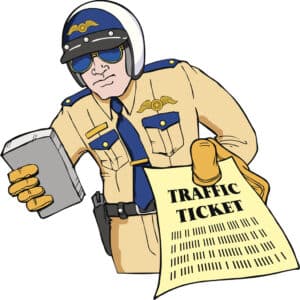Can I Recover Compensation if I Received a Traffic Citation in My Motorcycle Accident?
If you’ve been injured in a motorcycle accident, you may be wondering whether you’re eligible to recover compensation for your damages. In general, the driver who was at fault for the accident will be held liable and be required to pay for the damages incurred by the other driver. So, if the other driver was primarily at fault for the motorcycle accident, you will most likely be able to recover compensation.
But what happens if the other driver was primarily at fault, but you received a traffic citation in association with the accident? While this may complicate your claim, it doesn’t necessarily mean you’re no longer eligible to recover compensation. The exact circumstances of the accident will determine the impact this traffic citation has on your claim. For this reason, it’s critical to work with an experienced motorcycle accident attorney if you received a ticket.
Does a Traffic Citation Mean I’m at Fault for the Accident?
 While a traffic citation indicates you violated the law in some way, it doesn’t necessarily mean you were at fault for the motorcycle accident. There are many reasons why you may receive a ticket, and sometimes it has nothing to do with the cause of the accident.
While a traffic citation indicates you violated the law in some way, it doesn’t necessarily mean you were at fault for the motorcycle accident. There are many reasons why you may receive a ticket, and sometimes it has nothing to do with the cause of the accident.
There are two different types of traffic citations issued:
- Moving violations
- Non-moving violations
Non-moving violations refer to infractions of the law that aren’t associated with your driving actions. Common examples include citations for not wearing a seatbelt, not having valid vehicle registration, or having a broken headlight/taillight. In most instances, non-moving violations will not impact the determination of who was at fault.
Moving violations, on the other hand, are issued when your driving actions break the law. Common examples of moving violations include:
- Speeding
- Reckless driving
- Running a red light or a stop sign
- Failure to yield the right of way
- Texting and driving
- Failure to use a turn signal
In many instances, a moving violation will indicate that you are at least partially at fault for the accident. However, it doesn’t necessarily mean you were entirely (or even primarily) at fault. For example, if you were issued a speeding ticket but were injured when another driver ran a red light, the other driver’s actions most likely will be considered the primary cause of the accident. Therefore, you may still be eligible to recover compensation in situations where the other driver was still mostly at fault, even if you received a ticket.
How Will My Traffic Ticket Impact My Motorcycle Accident Claim?
Even if your traffic citation doesn’t prevent you from recovering compensation, it may impact the amount of money you’re able to receive from the other driver. Colorado adheres to a modified comparative negligence law when determining the level of compensation in personal injury lawsuits. Under comparative negligence, your compensation will be reduced by the percentage of fault attributed to your actions. Furthermore, if you are determined to be more than 50% at fault, you will no longer be eligible to recover compensation.
Let’s return to the example above where you received a speeding ticket, but the accident was caused by the other driver running a red light. If you were determined to be 30% at fault for the motorcycle accident due to speeding, you would only be able to recover 70% of the total damages you suffered. If your damages equaled $100,000, your recovery would be reduced to $70,000.
In general, only moving violations will impact the determination of fault. However, there are some situations where a non-moving violation may still impact the amount of compensation you receive. The most common example involves a seatbelt citation. If you were issued a ticket for failing to wear a seatbelt, it may be determined that your injuries wouldn’t have been as serious if you had worn a seatbelt, and therefore your damages may be reduced accordingly.
While there are no seatbelts on a motorcycle for a rider to use, a similar situation can arise if you fail to wear a helmet. Colorado helmet laws don’t require riders over the age of 18 to wear a helmet, so you won’t receive a ticket for failing to do so unless you’re a minor. However, failing to wear a helmet may be determined to have made your injuries more severe, which may possibly reduce your compensation accordingly. However, because it is legal to not wear a helmet while riding a motorcycle, there is law that states it is not a failure to mitigate your damages if your injuries are worse as a result. That being said, a jury will know you were not wearing a helmet and may, despite the law, hold that against you nonetheless.
Due to the ways in which comparative negligence laws can significantly impact your compensation, it’s crucial that you work with an experienced motorcycle accident lawyer who can demonstrate that the other driver was predominantly at fault for your injuries.
Traffic Citations Aren’t the Only Indicator of Fault
 While traffic citations are often an important tool used in determining fault in a motorcycle accident, there are other ways to prove the other driver’s negligence. If you’ve received a ticket for a moving violation, additional evidence will often be necessary to demonstrate that the other driver was primarily at fault. Some of the evidence you may use to establish fault includes:
While traffic citations are often an important tool used in determining fault in a motorcycle accident, there are other ways to prove the other driver’s negligence. If you’ve received a ticket for a moving violation, additional evidence will often be necessary to demonstrate that the other driver was primarily at fault. Some of the evidence you may use to establish fault includes:
- Pictures of the accident scene
- Footage from nearby traffic and security cameras
- Location of damage on each vehicle
- The presence of skid marks or other indicators that show how the accident occurred
- Testimony from witnesses to the accident
- Testimony from accident reconstructionists
- Additional information contained in the police report discussing who was at fault
Due to the potential impact your ticket may have on your compensation, it’s crucial to speak with Mr. Pushchak at once. He will need to investigate the case while all evidence is still intact and witnesses have fresh memories of the accident.
Pushchak Law Can Help
If you’ve been injured in a motorcycle accident caused by the negligence of another driver, you may be entitled to compensation for your damages. While it’s always important to have legal representation in a motorcycle accident case, it’s especially critical if you received a traffic citation. At Pushchak Law, we’ll make sure your rights are protected every step of the way.
Brian Pushchak has made motorcycle accident cases a primary focus of his practice. He understands the way a ticket may impact your claim, and he can help place you in the best position to minimize the effect it may have on your compensation. This expertise will give you the edge you need in these complex cases.
You’ll also benefit from Mr. Pushchak’s exclusive Informed Decisions™ Approach focused on helping you get the best possible outcome. Our Informed Decisions™ Approach keeps you in control of the entire process. Mr. Pushchak will listen to your story in order to understand what happened, and he’ll discuss your goals for the case in detail. He’ll then explain your legal rights and options in detail and recommend the best strategy to achieve your desired outcome. You’ll always have the ability to ask questions about these recommendations, and you will always have the final say on the strategy used.
Contact us today to schedule a free consultation. Pushchak Law serves clients in Denver and the surrounding areas of Colorado.
- How Does Scarring and Disfigurement Impact My Dog Bite Settlement? - April 9, 2024
- Do You Need a Driver’s License to Get a Motorcycle License in Colorado? - March 29, 2024
- How Old Do You Have to Be to Ride a Motorcycle in Colorado? - March 18, 2024
Free Case Consultation
If you have been injured and would like to speak with one of our attorneys, take advantage of our free, no-obligation consultation. And if you have a viable case, there are no fees until we win.
Call 303.372.6145


